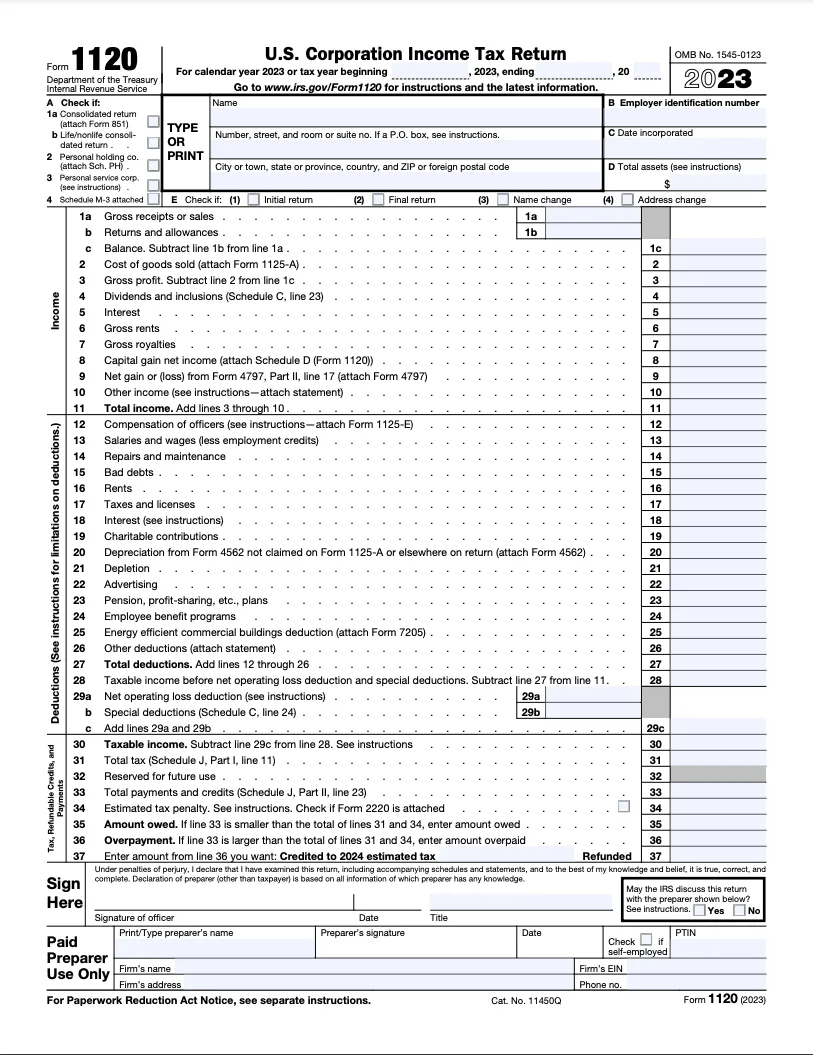Tax season is a dizzying time for anyone, especially startup founders. The last thing you want to be dealing with are forms, withholdings, or deadlines — you’ve got your business to run! One key piece of the tax season puzzle is a Form 1120, aka the Income Tax Return. It might seem intimidating at first glance, but trust us; it isn't as daunting as it may appear. Here’s a startup founders guide to understanding you Form 1120. Let's dive in!
What is a Form 1120?
A Form 1120 is a tax document used by corporations in the U.S to report their income, gains, losses, deductions, credits, and to figure out their income tax liability. It is comprised of several sections tailored to capture different aspects of your business activity. From your business's basic information (like EIN, business name, and address) to comprehensive financial details - this form leaves no stone unturned.
But what if my startup didn’t generate any revenue over the last year, do I need to submit one? Yes, even if your startup did not earn any income in a given year, you are still required to file Form 1120 since it doesn’t just pertain to revenue.

Key sections in the Form
- Income: This section is where you report gross receipts or sales and cost of goods sold.
- Deductions: Here, you indicate various expenses such as salaries and wages, rents, taxes and licenses, interest, and more.
- Tax and Payments: This section accounts for the corporation's tax liability, payments, refunds, and credits.
- Schedule K: This part covers additional information like foreign transactions, special deductions, and tax preferences.
When is Form 1120 Due?
Form 1120 must be filled out and submitted to the IRS by the 15th day of the 4th month after the end of the corporation's tax year. However, startups can request a six-month extension to file their tax return by submitting Form 7004.
Materials Needed to Complete Form 1120
Filling out Form 1120 requires a thorough understanding of your financial year's ins-and-outs. Having these documents close will aid the process:
- EIN letter
- Basic business information
- Shareholder records (names, SSNs, addresses, etc.)
- Existing tax documents
- Prior year tax returns
- Financial statements
- Capitalization table
Remember, the more accurate and complete your financial information, the more accurate your Form 1120.
Tips for Submitting an 1120 Like a Pro
Finalizing and submitting your Form 1120 doesn't have to be an overwhelming task. Before you submit, here are a few things to keep in mind:
- Know Your Dates: Have a handle on your tax deadlines. Knowing when your taxes are due helps avoid penalties and shows investors that you've got everything under control.
- Thorough Records: Keep meticulous financial records. This practice will make Form 1120 easier to fill out and helps to avoid audits.
- Enlist a Professional: When in doubt, enlist a professional. If crunching numbers isn’t your forte, consider hiring a CPA with experience in startup tax. They can guide you through the minefield of tax obligations, credits, and potential savings.
Remember, understanding Form 1120 and how it fits into your startup's financial picture puts you in better control of your future, keeps the IRS happy, and helps cultivate a more robust and financially stable business. Moreover, accurately documenting the financial trajectory from the outset via Form 1120 can offer critical insights that may help guide the course of a startup's growth and development strategy.

